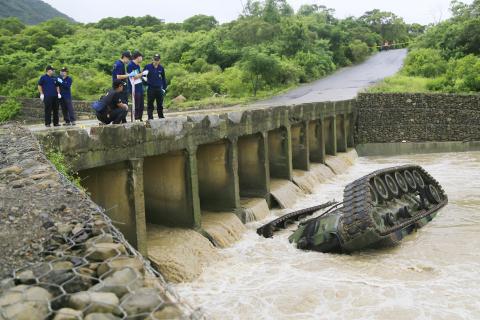An army CM-11 tank toppled into a creek in Pingtung County as it was returning to base from a training exercise yesterday morning, killing three of the five soldiers onboard, the army said.
The tank fell off a bridge into the Wangsha River (網紗溪), landing upside down.
The army quoted the driver, Private First Class Yang Yen-lin (楊炎霖), as saying that the tank’s left track was stuck and the brake was not functioning, and the incident occurred as he was making an attempt to turn left to cross the bridge.

Photo: CNA
Yang sustained only minor injuries and pulled himself out of the tank. The four others, who were inside the gun turret, could not escape through the turret’s hatches because the tank was upside down, he said.
Rescuers pulled them from the tank and sent them to a nearby hospital.
The four showed no vital signs at the scene, and Sergeant Chen Shih-kun (陳世坤), Corporal Chen Ping-yi (陳秉逸) and Private Chang Chih-wei (張志偉) were pronounced dead by the hospital.
However, doctors revived First Lieutenant Wu Te-wei (吳得瑋), though he remains in a coma, and he was transferred to Kaohsiung Armed Forces General Hospital.
Eighth Army Command Commander Lieutenant General Chi Lien-cheng (季連成) and his staff apologized at an afternoon news conference, offering their condolences to the families of the five soldiers.
“The exact cause of the accident remains to be investigated. The driver’s description is the only account of the accident available now,” 8th Army Command Brigade Commander Huang Chung-shih (黃忠實) said.
Yang was trained as a tank driver following his enlistment and has about three years’ experience driving tanks, Huang said.
Asked if driver fatigue could have played a role in the accident, Huang said there was no training on Monday night.
“The CM-11 battle tanks were produced in 1991, and the tank in question was 25 years old. All tanks were examined prior to the exercise and no irregularity was found,” he said.
Yang was able to escape on his own because he was in a separate chamber with a separate hatch, Huang said.
“The four others could have gotten out of the tank by themselves if the gun turret could have rotated normally. However, the tank was upside down and the turret was stuck,” he said.
Yesterday’s exercise was part of a regular six-week drill, and it was not held in preparation for the annual Han Kuang exercises scheduled for next week, Chi said.
The CM-11 “Brave Tiger” tanks were linked to a graft case last year, in which members of the military allegedly received bribes and kickbacks to help a machinery company secure procurement contracts for the treads used in several models of combat tanks.
Minister of National Defense Feng Shih-kuan (馮世寬) has ordered Chief of General Staff General Yen De-fa (嚴德發) to lead a task force to investigate the incident.

CHAOS: Iranians took to the streets playing celebratory music after reports of Khamenei’s death on Saturday, while mourners also gathered in Tehran yesterday Iranian Supreme Leader Ayatollah Ali Khamenei was killed in a major attack on Iran launched by Israel and the US, throwing the future of the Islamic republic into doubt and raising the risk of regional instability. Iranian state television and the state-run IRNA news agency announced the 86-year-old’s death early yesterday. US President Donald Trump said it gave Iranians their “greatest chance” to “take back” their country. The announcements came after a joint US and Israeli aerial bombardment that targeted Iranian military and governmental sites. Trump said the “heavy and pinpoint bombing” would continue through the week or as long

TRUST: The KMT said it respected the US’ timing and considerations, and hoped it would continue to honor its commitments to helping Taiwan bolster its defenses and deterrence US President Donald Trump is delaying a multibillion-dollar arms sale to Taiwan to ensure his visit to Beijing is successful, a New York Times report said. The weapons sales package has stalled in the US Department of State, the report said, citing US officials it did not identify. The White House has told agencies not to push forward ahead of Trump’s meeting with Chinese President Xi Jinping (習近平), it said. The two last month held a phone call to discuss trade and geopolitical flashpoints ahead of the summit. Xi raised the Taiwan issue and urged the US to handle arms sales to

State-run CPC Corp, Taiwan (CPC, 台灣中油) yesterday said that it had confirmed on Saturday night with its liquefied natural gas (LNG) and crude oil suppliers that shipments are proceeding as scheduled and that domestic supplies remain unaffected. The CPC yesterday announced the gasoline and diesel prices will rise by NT$0.2 and NT$0.4 per liter, respectively, starting Monday, citing Middle East tensions and blizzards in the eastern United States. CPC also iterated it has been reducing the proportion of crude oil imports from the Middle East and diversifying its supply sources in the past few years in response to geopolitical risks, expanding

OTHER OPTIONS: Given possible US intervention and Taiwanese counterattacks, China might opt to blockade Taiwan or take its outlying islands instead of an all-out invasion A US think tank has urged Taiwan to adopt a “hellscape” strategy that would flood the Taiwan Strait with drones and other uncrewed systems to deter invasion by China. In its report, Hellscape for Taiwan, published on Thursday, the Center for a New American Security said Taipei’s asymmetric defense approach — often described as a “porcupine strategy” — needs to evolve to keep pace with the growing capabilities of the Chinese People’s Liberation Army. The “hellscape” strategy involves saturating the air and waters around Taiwan with thousands of drones and other platforms capable of striking invading forces from multiple domains at once. Long-range